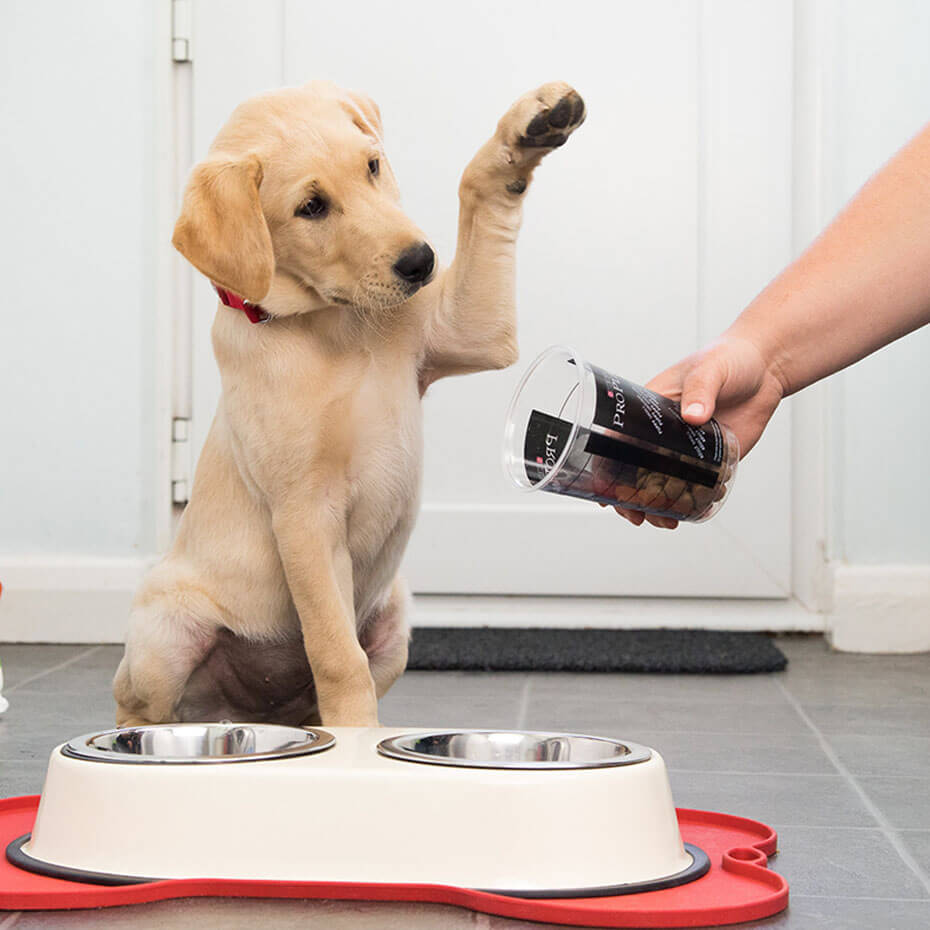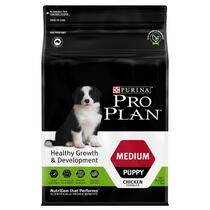

If you're looking to bring a new puppy into your life, you may be wondering about the potential financial implications that come with it. Find out everything you need to know with our handy guide.
Deciding to get a new puppy is incredibly exciting, but often, people don’t spend enough time thinking about the financial obligations that go with it. While you may believe that it’s simply a case of having enough money to purchase your furrever friend, your puppy’s first year brings a wealth of costs that you need to account for too.
If you’re thinking of opening up your home to a new puppy, you may be wondering what are the costs that you need to consider. Keep reading to find out what expenses you should expect in your pup’s first year.
Buying a puppy
The first question on your journey to puppy ownership will likely be how much does a puppy cost? The first factor that will influence this is the breed, as more in-demand breeds like Labradors and Bulldogs will always carry a higher price tag. It may also depend on the puppy’s heritage, if they’re from a showing background or if they're from certified dog breeders.
Another question to consider when asking how much is a puppy is that if you’re buying from a reputable breeder, the costs will likely be higher. This is due to the fact that the sale of a puppy needs to cover running their business as well as providing high quality care. There are many costs a breeder will have to cover such as screening tests for the parents (if they’re a breed prone to illnesses), possibly stud services, de-worming and vaccination costs, registration fees and so much more. One thing to be aware of is to watch out for low prices, these can indicate a puppy mill or farm or reflect poor quality of care.
If you’re not prepared to shell out hundreds or sometimes thousands on a puppy, you could consider adopting a puppy instead. You’ll still have to pay a fee which will cover their time at the centre, but this will usually be considerably less than buying a puppy from a breeder. Additionally, your adoption fee will also probably cover microchipping, vaccinations and neutering (provided they’re old enough).
Puppy vaccinations
Once you’ve got your puppy, the next step is vaccinations. These are essential as they’ll protect your puppy against diseases or illnesses. The puppy vaccinations cost will depend on your veterinarian, so make sure to consult your local vet for the standard set of vaccines your puppy needs.
They’ll need these first vaccinations when they’re 6 – 8 weeks old, with the second following 1 – 2 weeks later. When buying from a reputable breeder or rescue centre, these vaccinations will usually already have been done before you pick them up. After that, you’ll need to take your pup for an annual booster. If your puppy hasn’t yet had their injections, some veterinarians will offer a ‘puppy club scheme’ which will cover puppy vaccination costs and may also include microchipping and help with neutering.
Spaying or neutering a puppy
This question should definitely factor in to your calculations into how much a puppy costs. If you don’t intend to using your dog for breeding, you should consider getting them spayed or neutered.
Spays will be more expensive as it involves internal organs, whereas castrations will be cheaper. The cost will also depend on the breed and size of your dog, as larger dogs will cost more because they'll require more anaesthetic and the surgery will take longer. If you need financial support with this, many animal charities and organisations can help owners cover the cost of these procedures too.
Puppy training costs
Costs of puppy training classes will depend on what you’re looking for. You might want to look into the different types of training courses from available dog trainers online.
Young puppies require a lot of training and attention and if you’re new to dog ownership, puppy training classes can be a great idea. Not only can they tell you how to teach your puppy good manners, but they’re also an excellent way to socialise your puppy as if you choose a group training class, there will be plenty of other pups to play with.
Puppy insurance
The cost of owning a puppy is already high, just to cover everyday care for puppies and providing them with everything they need, but could you afford to pay for big vet bills if something goes wrong? Taking out puppy insurance will help covering any medical treatment they might have in their lives, such as surgeries or expensive medication.
You can pay monthly or yearly for puppy insurance polices and the premiums will depend on your dog’s breed. More expensive breeds that are prone to inherited illnesses or diseases will always cost more to insure than a mixed breed, as there’s more of a risk that veterinary care will be required during their life. While you may think that puppy insurance is just another unneeded cost, it could save you thousands down the line if your dog is ever injured or sick.
Routine worming treatments
Another cost to factor in to your puppy cost considerations is regular worming treatments. Puppies are actually most at risk for contracting worms and this is due to the fact that they can be passed on in utero and through the mother’s milk. The initial worming usually takes place when your pup is aged between two – three weeks, then it’ll need to be done every 2 weeks until they’re twelve weeks old. After this, your puppy will need to be wormed once a month until they reach six months of age.
Regular de-worming is something that will be consistent throughout your dog’s life and to keep them healthy, it’s recommended to worm at least three times a year. You can get this from your veterinarian, alternatively, you can buy it from your local pet store. You should also ensure that you purchase an option that’s specifically suited to your dog’s weight/size.
Flea treatment costs
Another regular puppy cost you’ll need to think about is flea treatments. It’s important to keep on top of this and remember to de-flea your dog once a month to ensure both your pup is healthy and to prevent a potential infestation in your home.
You may get your puppy's flea treatment from your local pet store or buy it from your veterinarian. Similar to worming treatment, you’ll also need to choose an option that’s suitable for your pup’s size and weight.
Doggy day-care
If you have a full-time job, you’ll need to find someone to care for your pup throughout the day. There are a wealth of dog day-care and sitting services available, including dog walking –which involves an individual collecting your dog from your house and taking them on a walk – and doggy day-care services, where your pup will be taken to spend the day at a dedicated centre, full of other dogs for them to play with.
Dog grooming costs
If you have a longer coated breed, they’ll usually require additional attention from a groomer, and this can work out to be quite costly. When it comes to the price of dog grooming, it will largely depend on your dog’s breed and size.
Costs of puppy essentials
If you’re wondering about how much is a puppy, you also need to think about regular costs. Dog food is a significant expense, depending on if you’re looking to feed wet, dry or a combination of both. And, don’t forget about the treats too! Puppy training requires plenty of tasty snacks to help with the training process, but make sure you don’t give too many as this may upset their little stomachs!
Once you get to the puppy teething stage, you’ll find your four-legged friend may go through toys faster than you thought possible. It’s a good idea to purchase a variety of toys, including plenty of hard wearing chews to save both your furniture and hands. Good quality toys will cost more but this is depending on the toy type, as rope toys and tennis balls will always be significantly cheaper, yet they might not last as long.
You’ll also need to think about sleeping arrangements for your new pup. It’s important that you provide them with somewhere comfy to nap throughout the day – and as a puppy they’ll need to nap frequently! The average price will depend on the size and overall quality.
You may also want to get a crate for your pup to sleep in at night. These are ideal for the first few months as you’ll be able to sleep soundly knowing your puppy isn’t getting up to mischief in the night!
Your new puppy will need a collar and harness to prepare them for trips out into the wider world. You’ll probably go through several collars as your puppy grows and believe us, they grow quickly!
Before your puppy is fully toilet trained, putting training pads around your house in areas they’re likely to toilet can be a real-life saver. These training pads could definitely save you from additional carpet cleaning fees.
Whenever your pup has had their vaccinations and is ready to start going on daily walks, you’ll always have to make sure you have poo bags to hand! When your dog needs to go, they need to go and you don’t want to be caught out as you could face an on the spot fine. Prices for poop bags will usually depend on the quantity and brand.
Puppy seasonal costs
It's also worth being aware that there will be additional puppy costs to consider depending on the season and temperature. The most common seasonal costs are as follows:
Some dog breeds such as Huskies, Akita’s and Newfoundland’s do quite well in colder weather, however, smaller, shorter haired breeds like Chihuahua’s and certain terriers do not appreciate it at all. For these breeds, you can purchase items to make the colder months more bearable like dog coats and heated blankets to make sure they’re comfortable. Dog coats with lighter fleeces are usually cheaper and waterproof wax styles are at the higher end of the scale.
During the hotter months, your main focus will be keeping your four-legged friend cool and luckily, there are products available that can help with that. A lot of dogs don’t like the sound of fans and it can be a struggle to keep them cool when the temperatures rise, but you can actually get cooling mats to help with this. These are filled with non-toxic gels and can be a real help for your pup.
If you can, it can be a good idea to buy a paddling pool for your dog to take a dip on really hot days. Make sure you buy a hard, plastic paddling pool and not a blow up one, the last thing you want is your dog’s paw popping it!
So that's everything you need to know about how much does a puppy cost! Want to find out more about getting a new dog? Take a look at our content hub for more useful guides and advice.















